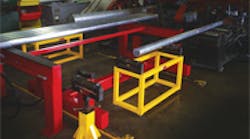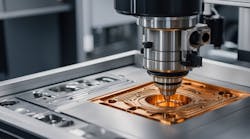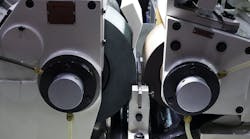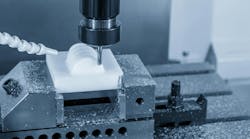Business is good at Kirsan Engineering, but it can always make room for more. The shop thrives on repeat contract work from over 20 customers. However, just six or seven of those customers make up 90 percent of the shop’s business, and Kirsan Engineering likes it that way.
Jerry Ring, general manager at Kirsan, said that for his shop, he’d rather have a few top customers that he can focus his service on. That way, Kirsan builds relationships with its customers and can better service them. While business is holding steady, Kirsan is constantly in the process of developing new customers; its goal is to add three or four new ones per year.
Kirsan serves markets such as aerospace, mining, defense, and medical. Their sales have grown over 30 percent each year for the past seven years. The shop also serves customers involved in wheel services, brake lathe, and wheel balancing components. Additionally, Kirsan has customers in the power-generation industry and in the production of positive- displacement flow meters. It also manufactures components for its parent company Ocenco Inc., a producer of self-contained breathing apparatus.
Most of Kirsan’s customers submit blanket orders, followed by periodic releases of jobs. They are not really P.O.s, but rather more along the lines of long-term agreements.
Customers place release orders until a previously agreed upon quantity is filled. For a few of its customers, the shop provides consignment inventory/ inventory management, delivering parts a few times per week or “vendor managed inventory.”
Job volumes for customers range from 100 to 250,000 parts per year, with the average single job running between 25 and 300 pieces. Kirsan’s main processes include mostly milling and multi-tasking turn-milling. Ring believes there are a few key factors that set his shop apart from the competition. These include developing/ training its workforce, standardizing on one brand of machine tools, and proper tooling management.
In the past, Kirsan purchased machines based on tool room work, and had a hodgepodge of different machine types and brands on its shop floor. Now, the shop has standardized on Mazak machines.
“The benefit of staying with one tool manufacturer allows machinist’s to move from a lathe to a horizontal with less training. They are more comfortable with the program codes, and the screen layout is very similar for the machines. The other benefit is machine maintenance. Machine problems that might arise are more similar, and navigating them is easier. For instance, whether it’s a lathe, horizontal, or vertical, the machines have similar parts, drives and motors” explained Ring.
The shop’s current machines, as compared with its previous ones, help reduce part cost, which customers routinely demand. Newer high-efficiency horizontal machining centers and multi-tasking turning centers with part feeders make it possible to process parts differently than the shop had in the past. The new machines use automatic part loaders and are able to finish the parts in one operation.
Efficiency levels, once below 60 percent for the shop’s old vertical machines, now run over 90 percent for its horizontal machining centers. These machines, said Ring, can always be running, and he indicated that the shop is slowly moving away from using vertical machining centers. However, the shop does keep some simple machines around because, Ring said, “The shop is not going to run simple less-complex parts on a quarter-million- dollar machine. That would put a higher burden and rate on a lowerdollar part. Simple parts call for simple machines, and if volumes are high enough, they justify keeping some basic machines around.”
| • Kirsan Engineering Kenosha, Wis. www.kirsan.com • Number of employees — 51 • 2009 sales — N/A • Markets served: Aerospace, mining, defense, and medical |
Kirsan employs 51 people, and at one point, operated 24/7, which was tough to do on weekends. By cultivating its machinists with in-house software training and off-site training offered by machine tool suppliers, Kirsan has greatly improved its capabilities. Machinists are supplied with laptops for training at home, and the shop pays for completed training courses.
The philosophy is that the more high-level machinists a shop has, the less overall labor is needed. In addition, Ring said the higher-level machinists seem to be more reliable because they “invest in” the company and become better team players, versus just being an “employee.”
Technically, Kirsan still operates 24/7, but on weekends, employees scheduled to work have the luxury of coming in as needed to make sure machines are loaded with raw material and remain running. Thus, the shop gains an entire weekend worth of production with minimal labor cost without having a fully manned weekend shift.
“Weekends used to require a full shift’s worth of employees. Now one person can keep many machines going without spending the whole day at the shop,” said Ring. “Of course you have to have machines with the capabilities to run unattended for this to work.”
Kirsan organizes its machines into cells, and each one has an assigned coordinator on first shift. On second and third shifts, one coordinator oversees all the cells. This is because first shift is for setting up machines, processing prototype parts and one-off jobs, while the off shifts involve basically tending machines that are already set up and running.
Kirsan has also greatly reduced its tooling cost to about 2 percent of shop sales by working more closely with tooling suppliers and implementing a full time tooling person.
Along with standardizing with one tooling supplier, the shop established an internal inventory system that links to the tooling supplier. They also incorporated a vending-machine system that keeps all tooling in one centralized place, not scattered around in individual tool boxes.
In addition to contract manufacturing, Kirsan offers customers full-time engineering services and strives to team up and partner with customers. Its engineering capabilities have also paid off in terms of product development.
When business slowed a bit in 2009, Kirsan marketed two products which it designed for its own use. One is a bar-loading system for band saws, the other a self-contained power unit for workholding applications.
The bar loading system eliminates the need to move and load bar stock, bundles of stock or tubing using a jib or gantry crane. Instead shops can use a forklift to load sawing material. By using the loader, one operator easily keeps two saws fed with stock and has time to also balance parts and load/unload deburring machines at Kirsan.
Kirsan’s self-contained power unit (SCPU) is a hydraulically powered fixturing system, but it has no external hydraulic reservoir, pump or hoses. Instead, a shop’s CNC machine tool’s spindle itself activates the system using a special tool, with no modifications necessary to the machine. This also reduces labor requirements and can easily allow robotic implementation.








